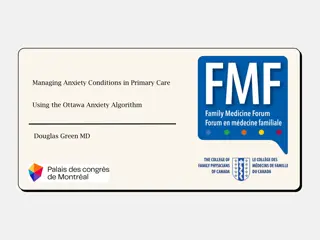
Effective Strategies for Managing Anxiety Through Nutrition and Lifestyle
Collaborative care is essential in the treatment of clients experiencing anxiety. This involves understanding the role of nutrition and lifestyle in preventing and managing anxiety symptoms. Interactions with clients should focus on food recall patterns, overall appetite, and co-morbidities. Specific nutrients like magnesium, Omega-3, and polyphenols play a crucial role in alleviating anxiety. Setting goals and implementing related interventions can help clients improve their dietary habits and overall well-being.
Download Presentation

Please find below an Image/Link to download the presentation.
The content on the website is provided AS IS for your information and personal use only. It may not be sold, licensed, or shared on other websites without obtaining consent from the author. If you encounter any issues during the download, it is possible that the publisher has removed the file from their server.
You are allowed to download the files provided on this website for personal or commercial use, subject to the condition that they are used lawfully. All files are the property of their respective owners.
The content on the website is provided AS IS for your information and personal use only. It may not be sold, licensed, or shared on other websites without obtaining consent from the author.
E N D
Presentation Transcript
Treatment of Clients Experiencing Anxiety A Collaborative Approach to Care February 24, 2018 * Tex-CHIP Training Series
Role of Nutrition & Lifestyle in Prevention/Management of Anxiety Symptoms
Understanding Provider Role in Preventing and Treating Anxiety Nutritional assessment: Foods, beverages, supplements, and medications Eating patterns, allergies, therapeutic adjustments (viscosity of beverages) bowels, food preferences and aversions, socioeconomic barriers, and religious beliefs Work with co-occurring medical conditions (diabetes, heart disease, IBS, elevated cholesterol, high blood pressure, kidney disease) Setting for treatment: psychiatric facilities group homes early intervention programs outpatient clinics patient s own home
Considerations when Interacting with Clients Identify pattern in food recall Overall appetite Eating disorder Obesity Co-morbidities Blood glucose Caffeine & Alcohol intake Cooking Vitamin D deficiency Social Anxiety, Phobias Depression present Exercise
Food Recall Time or meal Food Quantity Method of prep Where consumed
Goals & Related Interventions Goals: No skipped meals More brain foods Reduced sugar and processed foods Reduce/eliminate caffeine, alcohol Keep blood glucose normal Cook meals at home Exercise 1-2 days a week (30 minutes) Interventions: Eat every 3-4 hours Goal setting Check and log blood sugar (if needed) On-line grocery shopping Exercise log/app
Specific Nutrients Magnesium: Whole grains, oats Seeds, nuts, peanuts Leafy greens Yogurt Dark chocolate (>70%) Omega-3 (Supp. 1-3g/day) Salmon, tuna Grass-fed beef and dairy Flax and chia seeds Walnuts Polyphenols (antioxidants) Berries, cherries Plums, apples, pomegranates, Spinach, broccoli Black beans Black olives Soy milk, soy yogurt Turmeric
Specific Nutrients (contd) Gamma-aminobutyric acid (GABA) neurotransmitter Yogurt and fresh cheeses (parmesan, provolone, cheddar), Almonds, Bananas and citrus, Broccoli and spinach, Brown rice, oatmeal Probiotics yogurt pickles, sauerkraut kefir Zinc cashews, beef, eggs Vitamin D cheese, eggs, milk, enriched cereals, mushrooms
Measuring Outcomes/ Success Food Journal: Eating 3-5 meals a day (include 1 brain food in each meal) Balance in diet Limit sugar and replacing simple carbs with whole grains Elimination of caffeine, alcohol Stabilized blood sugar Cook at least 1-2 meals at home a week Exercise 1-2 days per week for 30 minutes
Communication from Counselors Your assessment all team members all be on same page Phobias What their drinking May disguise as food intake






















